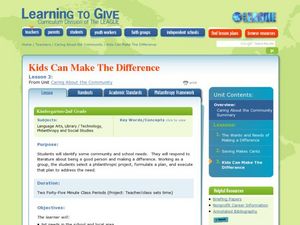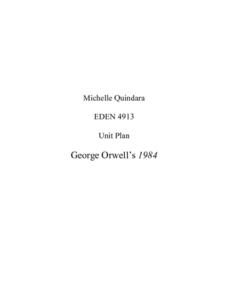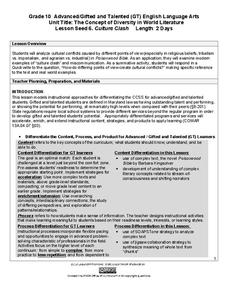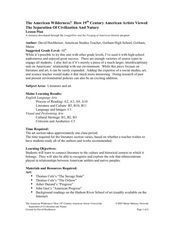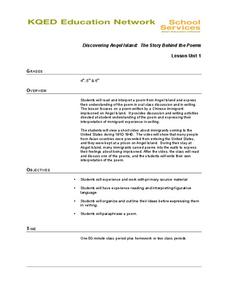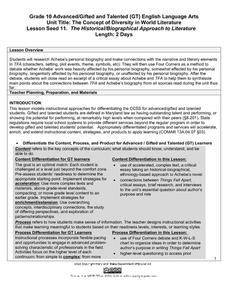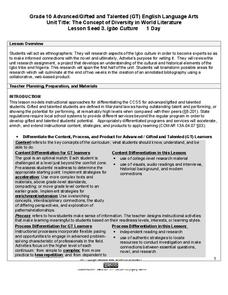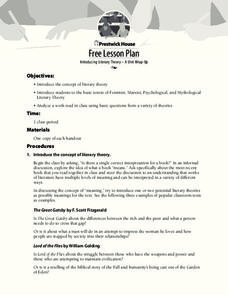Curated OER
Kids Can Make a Difference
What is a philanthropist? We can all be philanthropists! After assessing the needs of the school and listening to literature about how they can help others, primary learners develop a class project and maintain a journal of their...
Curated OER
Generations: An Exploration of our Families Through Literature
Students complete a unit of lessons on families. They read and analyze various stories, label a map, assemble sentences, write letters to grandparents, analyze character traits, and write and illustrate a sheet for a class book.
Curated OER
Literature: Satire in the American Dream
Eleventh graders examine cartoons for examples of satire, irony, and sarcasm. They write essays about cartoons, art work, or literature analyzing it for satirical elements. Finally, they create their own piece in one of the three areas...
Curated OER
Edgar Allan Poe: an Author Unit
Eighth graders study the life and writing of Edgar Allan Poe in this unit of work.
Curated OER
Mini-Unit: Natural Resources
Learners explore how their choices affect others. In this character development and ecology instructional activity, students debate choice-making issues. Learners listen to The Lorax by Dr. Seuss and identify choices the characters...
Curated OER
Ancient Egyptian History/African Literature Activity
Students gain a conversant knowledge of some aspect of ancient African literature of the eighteenth dynasty (1572-1315 B.C.) in Egypt. They choose either to make a crossword puzzle or a word search with at least 20 key words from their...
Curated OER
Literature for Lesson 2 - The UnderGround Railroad
Learners examine the use of the Underground Railroad. In this Underground Railroad lesson, students determine the meaning of the word slavery. They study the Underground Railroad through the use of literature and Internet websites. They...
Curated OER
Introducing Literature Circle Roles to Students
Students read a narrative selection and select a literature circle role. In this reading comprehension lesson, students work in groups to identify vocabulary, make text connections, or other reading comprehension strategies. Students...
Curated OER
George Orwell's 1984
Eleventh graders engage in a literature study that is concerned with the strengthening of reading comprehension skills while they practice using context clues to arrange meaning to the text. The total assessments for this unit includes...
Maryland Department of Education
The Concept of Diversity in World Literature Lesson 6: Culture Clash
To prepare for a Quickwrite on the question, "How do different points of view create cultural conflicts?" class groups draw examples of religious, cultural, and political conflicts from Things Fall Apart and The Poisonwood Bible to use...
Curated OER
The American Wilderness? How 19th Century American Artists Viewed the Separation of Civilization and Nature
The attitudes of European settlers toward the American wilderness, as reflected in art and literature, is the focus of this resource packet designed for teachers. Included in the unit overview you will find lists or paintings and works...
EngageNY
Getting the Gist and Determining Word Meaning: Paragraphs 20–23 of Steve Jobs’ Commencement Address (and connecting to Chapter 10)
Groups create a list of the character traits of Steve Jobs and Buddy, the main character of Christopher Paul Curtis' Bud, Not Buddy, and share and select evidence from Jobs' 2005 Stanford University Commencement Address to support their...
Curated OER
Discovering Angel Island: The Story Behind the Poems
Poems carved into the wooden walls of the Asian immigrant prisons on Angel Island provide upper elementary graders an opportunity to study not only the story behind the poems but to also focus on the figurative language employed by the...
Maryland Department of Education
The Concept of Diversity in World Literature Lesson 12: Author's Purpose - Yeats and Achebe
Is there such a thing as fate/luck? Can one fight destiny? As part of their study of Chinua Achebe's purpose in writing Things Fall Apart, class members answer these questions from Achebe's point of view and then from William Butler...
Maryland Department of Education
The Concept of Diversity in World Literature Lesson 11: The Historical/Biographical Approach to Literature
How affected is Thinks Fall Apart by Chinua Achebe's personal biography? Using a four corners strategy, and evidence from their readings, class members debate the degree of biographical influence in Achebe's novel.
Maryland Department of Education
The Concept of Diversity in World Literature Lesson 3: Igbo Culture
What cultural concepts must readers understand in order to connect to Things Fall Apart? As part of their study of Chinua Achebe’s novel, class members research Nigeria and the Igbo culture to create a collaborative, web-based, annotated...
Digital Public Library of America
Teaching Guide: Exploring To Kill a Mockingbird
Harper Lee's To Kill a Mockingbird, considered by many to be a seminal piece of American literature, contains many complex literary themes that carry through United States history. Use a series of discussion questions and classroom...
Prestwick House
Introducing Literary Theory – A Unit Wrap-Up
Literary theories are lenses through which a text may be analyzed. The question in this lesson plan is how a particular literary lens can influence the reader's view of the text.
Curated OER
Rediscovering Children's Literature
Students, while analyzing children's literature works as a vehicle for a multitude of insights, practice analytical reading and writing scenarios about older adults. In retrospect, they read books aloud to young children as well as write...
Curated OER
Who Wrote That?
Students explore the Project Gutenberg website and conduct a webquest to answer questions about well known literature and authors.
Curated OER
Novel Ideas: History of the American Novel
Explore the history of the American novel in the contexts of literature and US history. How does a novel or piece of writing from a particular time showcase the mood during that historical period? After conducting research and discussing...
Curated OER
American Women Who Shaped the Civil Rights Movement Explored Through the Literature of Eloise Greenfield
Examine the women who contributed to the Civil Rights movement. In groups, children read excerpts of writings from Eloise Greenfield and research the women she mentions using the internet. To end the lesson, they create a timeline of...
Curated OER
Extreme Poetry Vocabulary
Challenge your class with this comprehensive list of literary vocabulary words. Learners take a pre-test, look up definitions, come up with an example, and then take a post-test. You might use this prior to a unit about poetic devices in...
Curated OER
Flat Stanley Travels to U.S. Regions
Fourth Graders read the book Flat Stanley by Jeff Brown. In the story a bulletin board flattens the main character. He is then sent in an envelope to a friend in California. During a fantasy genre language arts unit, groups of students...


